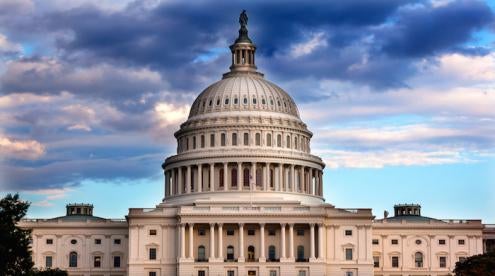Bipartisan talks in Washington continue with the aim of producing a significant COVID-19 response and economic “stimulus” measure that can be signed into law by President Donald Trump this summer. Republicans and Democrats remain far apart in the negotiations, according to sources on both sides of the talks. But discussions continue as pressure mounts on Congress and the White House to agree on an economic relief bill that will inject US$1 trillion or more into the American economy as it struggles to regain its footing amid the global coronavirus pandemic.
US policy updates included in this report:
- Federal budget and appropriations
- Health
- Trade
- Congressional coronavirus oversight and accountability
- State-level developments
Publication Note: Following a modified schedule, the next Public Policy Briefing will be available on Thursday, August 6, 2020.
POLITICO reports:
Not much action on the stimulus front on Monday despite meetings between White House and Hill officials. A senior administration official told [POLITICO] the sides remain miles apart on the size of enhanced unemployment benefits, aide to state and local governments and a handful of other big issues. Progress is only getting made on smaller stuff. This person said they still thought a deal would get done in the next week or two but had no idea what might lead to a breakthrough absent some really bad economic numbers putting enhanced political pressure on both sides heading into the heart of the election season.”
Bloomberg Government has a somewhat more upbeat take this morning on the status of talks, noting that House Speaker Nancy Pelosi (D-CA) and Treasury Secretary Steven Mnuchin, the latter representing the White House in the negotiations along with Trump Chief of Staff Mark Meadows, both indicated some progress is being made. “It was the first glimmer of optimism that the talks over the past week made some progress, as pressure grows among lawmakers in both parties to get a deal,” Bloomberg notes.
President Trump, who sought to make payroll tax relief a priority for the GOP in the negotiations over the COVID-19 response package but was rebuffed by Senate Republicans, is reportedly mulling the possibility of at least temporarily relieving the payroll tax burden on US businesses via unilateral executive action. The concept, advocated by Washington policy voices close to the Trump Administration, would involve having the Treasury Department delay payroll tax collections until after the November presidential election. President Trump would then put the burden on Congress to pass legislation relieving American businesses of the obligation to pay the taxes owed.
The US Senate is scheduled to leave town Friday to begin the traditional August congressional recess, but Senate Republican leaders are signaling the chamber is likely to stay in town if a bipartisan agreement is not in place before the end of this week. The US House of Representatives had been set to depart last Friday, but remains in Washington as discussions continue.
Appropriations Updates
In a 217-197 roll call vote last Friday, the House approved H.R. 7617, a legislative package providing funding and shaping policy affecting multiple federal government agencies and programs for fiscal year 2021. The US$1.31 trillion proposal was comprised of six individual funding bills – Defense; Commerce, Justice, Science; Energy and Water Development; Financial Services and General Government; Labor, Health and Human Services, and Education; and Transportation, Housing, and Urban Development. Twelve Democrats opposed the legislation on final passage and no Republicans voted in favor. The measure in its current form faces stiff opposition from the GOP-controlled Senate and President Trump.
An early indication of a president’s opposition to – or support for – pending legislation before the House or Senate is reflected in a Statement of Administration Policy, or SAP, issued by the Office of Management and Budget. SAPs identify specific provisions within legislation that the White House views as objectionable or that it views favorably, and provides an early indication of what changes are necessary in negotiations on final legislation in order to secure a presidential signature. When a SAP is issued indicating legislation may be subject to a presidential veto, the statement will express varying degrees of certainty about a veto by either declaring that the president intends to veto a bill, or that his senior advisors would recommend that the president veto a bill.
In its SAP to H.R. 7617 issued on July 30, the Trump Administration strongly criticized the six-bill appropriations measure citing efforts of the president last year to work with Congress to finalize a two-year budget agreement – the Bipartisan Budget Act of 2019 (Public Law 116-37) – which established spending limits for defense and non-defense discretionary spending. That agreement also included a prohibition against new policy riders and changes in mandatory programs without agreement from the president and the top four leaders in Congress – the House speaker, House minority leader, Senate majority leader, and Senate minority leader.
“H.R. 7617 . . . includes a number of provisions that would blatantly violate both the letter and spirit of this agreement,” declared the recently issued SAP. “The Administration opposes the inclusion of unrequested emergency funding in the bill and reiterates that Congress should honor the budget caps deal it agreed to in 2019. If H.R. 7617 were presented to the President in its current form, his advisors would recommend that he veto it” (emphasis added).
House approval of H.R. 7617 marked the culmination of a legislative marathon for the House Appropriations Committee, which marked up, amended, debated, and passed a total of 10 of 12 annual funding bills during the month of July. A week earlier, on July 24, the House passed H.R. 7608, a US$259.5 billion funding proposal consisting of four additional appropriations measures – State-Foreign Operations; Agriculture, Interior, and Environment; and Military Construction-Veterans Affairs. This measure also received a harsh critique from the Trump Administration, including a recommendation in its SAP issued on July 23 that the legislation “in its current form” would be subject to a presidential veto.
Cumulatively, the House spending bills include more than US$245 billion in emergency spending and dozens of policy provisions taking aim at Trump Administration policies addressing climate change, community policing, second amendment rights, COVID-19 related issues, among many others. The House also considered over 570 floor amendments during deliberation of the two appropriations mini-bus proposals.
While House passage of the majority of spending bills is a significant achievement, it marks only the beginning of a much longer legislative process that will likely stretch beyond the beginning of the new fiscal year in October – and require passage and enactment of a Continuing Resolution, or CR, in September. The GOP-controlled Senate, which has been unable to move any of its spending bills through committee because of partisan divisions over funding and policy, has yet to signal whether it will advance its own funding measures to be reconciled with the House. The three most likely Senate scenarios include: 1) marking up some but not all of its appropriations bills in September; 2) postponing markups until after the November election; or 3) posting draft bills online that would serve as the Senate’s opening position when formal negotiations with the House begin in earnest, likely later this year, on final fiscal year 2021 spending bills.
Health Updates
On Monday, President Trump issued an executive order (EO) aimed at improving healthcare in rural areas and extending certain telehealth reimbursement flexibilities that have been made during the public health emergency. The executive order would require the Secretary of Health and Human Services (HHS) to develop an innovative payment mechanism to pay rural healthcare providers. The EO also directs HHS to work with the Department of Agriculture and Federal Communications Commission to issue a plan to improve physical and communications infrastructure in rural areas. The Secretary of HHS is to issue a report on existing and future policy initiatives that will increase rural access to care; reduce maternal morbidity and mortality; and improve mental health. The EO’s request to propose a regulation to extend telehealth policy changes comes amid recent op-eds from HHS Secretary Azar and Centers for Medicare and Medicaid Services (CMS) Administrator Verma supporting such a move, as well as support in congress from key players such as Senate Committee on Health, Education, Labor, and Pensions (HELP) Chairman Lamar Alexander (R-TN).
On Friday, HHS and the Department of Defense announced an award of US$2.1 billion to the drug manufacturers Sanofi and GlaxoSmithKline (GSK) to support the development of 100 million doses of a coronavirus vaccine. Sanofi’s vaccine is based on recombinant protein technology that is also used in its influenza vaccine. The science of GSK’s vaccine is focused on an adjuvant, which helps create a stronger immune system response to those receiving a vaccine. Under the agreement, the vaccine would be available to American citizens at no cost. Sanofi and GSK join drug manufacturers Pfizer, Moderna, Novavax, AstraZeneca and Johnson & Johnson subsidiary Janssen in having promising vaccine candidates supported by the administration’s “Operation Warp Speed” initiative.
Also on Friday, Secretary Azar announced the extension of a deadline for Medicaid and Children’s Health Insurance Program providers to apply for money from the Provider Relief Fund. US$15 billion was set aside for providers who did not receive funding from phase one, the Medicare General Distribution, as well as certain dental providers. Relatively low numbers of applicants drove the extension of the due date from August 3 to August 28. Eligible applicants may receive up to two percent of reported revenue from patient care. The announcement also included HHS’ intent to reopen the portal on August 10 for Medicare providers who missed the opportunity to apply for the phase one Medicare General Distribution.
Trade Updates
On August 3, President Trump signed an executive order (“Aligning Federal Contracting and Hiring Practices With the Interests of American Workers”) calling for a broad review of the government’s use of visa holders and outsourcing across its extensive government contracting networks.
The White House announced that the executive order is, at least in part, a response to the federally-owned Tennessee Valley Authority’s decision to begin outsourcing overseas one-fifth of its US-based technology jobs. Outsourcing has become a more popular option for US employers seeking a way to cut costs and to avoid increasingly difficult visa adjudications created by President Trump’s restrictive immigration policies.
The executive order reiterates the president’s ongoing call to preserve US jobs for US workers, particularly during the economic crisis created by the COVID-19 pandemic. The meat of the executive order calls for all executive departments and agencies to review their contracting practices, but it also requires action to “protect” US workers from potential harm caused by H-1B visa holders. Further details will be available on our Employment Law Worldview blog.
Oversight Updates
Yesterday, the Office of the Special Inspector General for Pandemic Recovery (SIGPR) released its first report to Congress on the oversight SIGPR has conducted since Brian Miller was confirmed by the Senate as the Special Inspector General in June. While the SIGPR has faced challenges in setting up its office and devoted attention to ensuring that it does not step outside of its jurisdictional mandate, the SIGPR Office of Investigations has begun work on 12 open matters. The SIGPR describes seven of these investigations as “proactive” and relating to Title IV loan applications, and five as “reactive” to information provided by the public (related to a state’s unemployment benefits, business loans, and identity theft). And, among the issues SIGPR brings to Congress’ attention in the report is the “potential for widespread double-and triple-dipping under the CARES Act,” noting that, for example, several air carriers have received both Paycheck Protection Program (PPP) loans and Payroll Support Program payments. Additionally, the report invites Congress to resolve “potential ambiguities” regarding the Office’s jurisdictional mandate. While SIGPR concluded that it has oversight responsibilities over Division A loans, loan guarantees, and other investments by the Treasury, as well as programs managed by Treasury, SIGPR maintains that it has no jurisdiction over any program in Division B of the CARES Act (Emergency Discretionary Appropriations).
Last week, Representative James Clyburn (D-SC), the Chairman of the House Committee on Oversight and Reform’s Select Subcommittee on the Coronavirus Crisis, and Representative Nydia Velazquez (D-NY), Chairwoman of the House Committee on Small Business, launched an investigation into a US$500-million-dollar contract related to the Emergency Injury Disaster Loan (EIDL) program. The Small Business Administration (SBA) entered into this contract to outsource the processing of EIDL applications to Rocket Loans through a pre-existing contract with a small business, RER Solutions, which has just 40 employees. “Recent reports about the EIDL program raise questions about whether RER Solutions and Rocket Loans have provided adequate services to SBA and the millions of small businesses seeking EIDL funds,” the chairs wrote to the SBA Administrator Jovita Carranza and the two companies.
Also last week, Senator Elizabeth Warren (D-MA) sent letters to five companies—Walmart, Conagra, FedEx, 3M, and Kroger—requesting information about their attendance policies, and whether the companies inform their workers of their rights under federal law to take time off without punishment. The letters follow a report showing that many companies fail to inform workers of these rights, which Senator Warren views as a “particular concern” during the pandemic.
The Washington Post reported yesterday the findings of the nonprofit Project on Government Oversight, known as POGO, which showed that at least US$2 million in PPP loans went to Atlantic Diving Supply, a military equipment supplier that may not be a small business, as it claims to be. The company’s estimated annual sales in 2019 were more than US$1 billion. POGO’s report details the legal problems Atlantic Diving Supply has faced over the years, including previous challenges to the company’s small business credentials.
The New York Times reports that US$192 million to US$419 million in PPP loans has gone to more than 125 companies that Chinese entities own or invest in. This reporting is based on the analysis of the strategy consulting firm Horizon Advisory. The companies highlighted in the report include Continental Aerospace Technologies, which received a loan of up to US$10 million, and Aviage Systems, which received a loan of up to US$350,000. The companies are owned by Aviation Industry Corporation of China, a state-owned conglomerate, which the Department of Defense classified this year as a Chinese military company.
The Wall Street Journal reports that the hotel group Ashford Inc., which announced in May that it will return the US$70-million PPP loan it disclosed that it received, is under investigation by the Securities and Exchange Commission (SEC). The company’s SEC filings disclose that it received an administrative subpoena in June. When Ashford announced in May its decision to return the PPP funds, it emphasized that it had believed it legally qualified for the loan when it submitted the application and received the funds, but “continuous S.B.A. rule changes and evolving opinions by administration officials have led us to conclude that we may no longer qualify.”
State Updates
Yesterday, President Trump extended federal funding for National Guard forces that are working to respond to the coronavirus. Earlier in the day, the National Governors Association sent a letter to President Trump asking for the extension, saying unnecessary delays in extending Title 32 creates significant challenges for states and territories, who are in the middle of the coronavirus pandemic.
The federal funding and benefits for the National Guard members helping states across the country operate testing sites, distribute food and medical supplies and other initiatives was set to expire on August 21. That meant that states would have been required to pull Guard members off the front lines by August 7 in order to quarantine for two weeks before returning to their home communities. Governors had urged the president to continue to extend the use of Title 32 as part of COVID-19 recovery and reopening efforts, likely until a vaccine becomes available.
The Title 32 extension comes with a new caveat, however—ordering states to start picking up 25% of the cost — millions per month at a time states are experiencing financial hardships due to the coronavirus. This means there will likely be a state cost incurred with the use of Title 32 moving forward.
The Presidential Memorandum (PM) President Trump has signed is the 12th one related to the use of Title 32 for National Guard COVID-19 missions. The PM extends Title 32 authority until December 31.
This post features contributions from Meg Gilley and Genevieve Bresnahan.








 i
i


